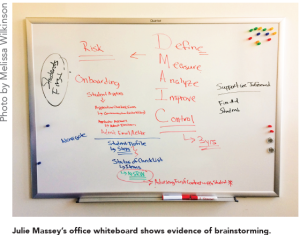Stress placed on developing stronger relationships between students and advisors
By: Melissa Wilkinson
Editor-in-Chief
STLCC’s academic advisory program is currently being revamped, according to Julie Massey, newly instated Manager of Student Success.
Massey, who started at STLCC as an advisor in 2004, became the Dean of Academic Advising at Meramec in 2011. Along with a small committee featuring representatives across all STLCC campuses, Massey is spearheading the effort to streamline the academic advising experience.
“Some of the goals we have are to enhance the relationship between advisors and students, to adapt and develop a more proactive advising philosophy, and to create a unified advising framework to provide more consistent services,” said Massey.
Part of the plan is to promote the advising program at STLCC so that more students are aware of what it can offer them. The current job of an academic advisor is to help students select and complete a program or certificate, or to complete requirements to transfer to a four-year university. According to Massey, students often don’t fully understand the benefits of contacting an advisor, or are unaware of all of the tools available to them through the advising often.
“Historically here, advising has been very transactional,” said Massey. “‘Here’s your classes, see you next semester.’ We’re working towards letting students know what they need before they need it.”
Tracy Rankin, an academic advisor at Meramec who started in 1999, said that the move to online registration resulted in a lack of communication between students and advisors, as well as the tendency for students to self-advise.
“We’re looking at adding a caseload model where students would have an assigned advisor,” said Rankin. “We’re hoping that will develop a stronger relationship between advisor and advisee.”
The caseload model would be a change from the current walk-in system, where students are assisted by whichever advisor is available at the time.
Another part of the plan is to utilize software called Navigate, designed to help a student from admission to graduation. Once a student is admitted, Navigate will give them a list of items they need to accomplish, such as submitting transcripts or taking preliminary exams. It also features a questionnaire which will help undecided students select the major that’s right for them.
“It doesn’t decide majors, but it will help prompt the conversation behind it,” said Massey.
Navigate will also allow students to create an academic plan, which they can see whenever they log in. Massey’s hope is that Navigate will not replace human advisors, but instead act as a tool to create a more personal experience between students and their advisors.
“It’s both staff and student facing,” said Massey. “It allows staff to see more about each student than what Banner allows us to see.”
Tracy Rankin said Navigate will provide for more effective communication between students and the college.
“Currently new students are less likely to read emails,” said Rankin. “We’re looking at communication through cell phones and texts…Navigate can help with that so students can stay in touch with their advisor.”
Massey stresses that the program update is still in its infancy, but hopes to put something into effect for fall 2018 students.
“I’m very passionate about all of this,” said Massey. “I’ve always been a strong proponent of putting students first, and I think all of what we’re moving towards will help to do that.”











